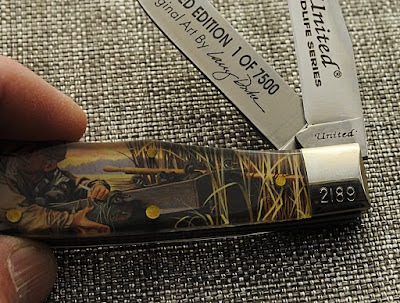I’m settled in for the next week
at home. I was cleaning a drawer and
guess what? I found two knifes I had
almost forgotten about.
It was 1990 and I was reading
Larry Niven’s Protector. Larry
represented the changes we experience in old age, due to a missing
environmental agent, as an incomplete transformation to a superior being. One of the attributes was skin so tough, so
armored it could turn a bronze knife. I
wanted a bronze knife, but even bronze was expensive on my budget.
 |
| The bronze has tarnished a bit and it isn't very sharp, but at one time this was atomic bomb of the era |
I was also interested in the
Spanish navaja. These are classic
Spanish folding fighting and utility knives.
The classic knife used a set of pinion teeth which when opened produce a
characteristic clicking sound. Hence the
nickname in some quarters, of cucaracha or cockroach. Navajas came in many sizes and the larger
ones were used for dueling. It was said
the sound of this knife opening in the darkness would make a brave man
blanch. Pretty cool, yes?
 |
| Small navaja |
Atlanta Cutlery made museum
quality replicas and sold other knives as well.
Their catalog is part of a select group of magazines I call knife
porn. The color photos were great, as
were descriptions of hard to find knives.
I used to dog ear pages to find my favorites faster. Prices lists were the worst part. One 1990 dollar had the purchasing power of $2.00
today.
Still I found what I wanted: a
small 1.75 inch bronze blade folder and a 3 inch blade navaja.
 |
| They originally had a ring attached to the pivot to open the lock. that evolved in to the little metal tab. |
The bronze bladed knife was
described as a sandalwood folder costing $27 and the navaja priced in at
$16.95.
I never used either. Everyone swapped out their bronze weapons as
soon as iron became available and even with the problem of rusting they were
happy to do so. I keep my bronze knife
in a little caddy with cuff links. It
really belonged on a pocket watch chain.
The navaja was a disappointment. Despite being made in Spain, it didn’t have
the click and clacking noise I was interested in.
It too, doesn’t have a maker’s mark.
While now as a collector I am
happy to own them, at the time it was one of many little lessons that wanting
is sometimes better than owning.


